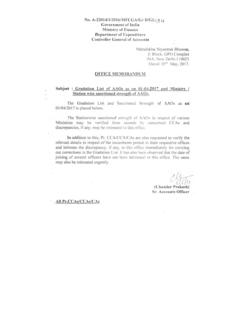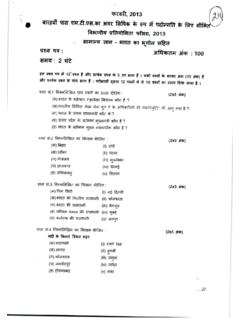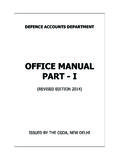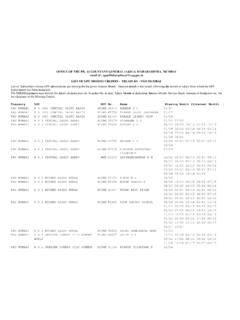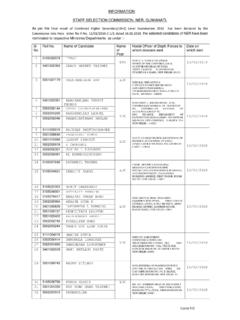Transcription of GOVERNMENT ACCOUNTING RULES - Controller …
1 GOVERNMENT ACCOUNTING RULES , 1990. Preamble - In exercise of the powers conferred by Article 150 of the Constitution, the President on the advice of the Comptroller and Auditor general , hereby makes the following basic RULES relating to the form of accounts of the Union and States. This compilation incorporates also the general principles of GOVERNMENT ACCOUNTING laid down by the Comptroller and Auditor general for the guidance of GOVERNMENT Departments, namely:- Chapter I - INTRODUCTORY. 1. Short Title and Commencement. These RULES may be called the " GOVERNMENT ACCOUNTING RULES 1990" and will come into force with effect from 1st April, 1990. 2. Definitions In these RULES , unless the context otherwise requires, . (a) 'Accountant general ', means the Head of an Office of Accounts subordinate to the Comptroller and Auditor general of India.
2 (b) 'Bank' means any branch of the State Bank of India acting as the agent of the Reserve Bank of India in accordance with the provisions of the Reserve Bank of India Act, 1934 (2 of 1934), any branch of a subsidiary bank as defined in section 2 of the State Bank of India (Subsidiary Banks) Act, 1959 (38 of 1959) which is authorised to transact GOVERNMENT business as agent of the State Bank of India, or any branch of a bank as may be appointed by the Reserve Bank of India as its agent under the provisions of sub-section (I) of section 45 of the Reserve Bank of India Act, 1934 (2 of 1934);. (c) 'Chief ACCOUNTING Authority', means the Secretary of a Ministry or Department of the GOVERNMENT of India in which the Departmentalised System of ACCOUNTING has been introduced and in the case of a Union Territory with separated accounts, its Chief Secretary/ Chief Commissioner.
3 (d) 'Civil Accounts Officer', means an Accounts Officer subordinate to the Comptroller and Auditor general , or a Principal Accounts Officer and or Pay and Accounts Officer functioning under the Scheme of Departmentalisation of Central GOVERNMENT (Civil) Accounts or under separated accounts set up of a Union Territories, GOVERNMENT or Administration as the context may imply. The expression 'Civil Accounts Office' should also be construed accordingly. (e) 'Comptroller and Auditor general ' means the Comptroller and Auditor general of India appointed under article 148 of the Constitution of India. (f) ' Controller general of Accounts' means the Controller general of Accounts in the Ministry of Finance (Department of Expenditure), who inter alia, is responsible for prescribing the form of accounts of the Union and States, and to frame, or revise, RULES and Manuals relating thereto on behalf of the President of India in terms of article 150 of the Constitution of India, on the advice of the Comptroller and Auditor general of India.
4 (g) 'Consolidated Fund' means the Consolidated Fund of India or of a State, referred to in clause (1) of article 266 of the Constitution, or of a Union Territory GOVERNMENT , referred to in Section 47 of the Union Territories Act, 1963, or all the three, as the context may imply (Appendix -1). (h) 'Contingency Fund', means the Contingency Fund of India established in pursuance of clause (1) of article 267 of the Constitution or the Contingency Fund of a State established in pursuance of clause (2) of article 267 of the Constitution, or the Contingency Fund of a Union Territory GOVERNMENT established in pursuance of Section 48 of the Union Territories Act, 1963, or all the three, as the context may imply (Appendix-1). (i) 'Defence Department' means that Department of the Central GOVERNMENT , whose expenditure is met from the Demands for Grants relating to Defence Services.
5 (j) ' GOVERNMENT ', means the Central (Union) GOVERNMENT or a State GOVERNMENT , or a Union Territory GOVERNMENT , or all the three, as the context may imply. (k) 'Public Account' means the Public Account of India or the Public Account of a State referred to in clause 2 of Article 266 of the Constitution or both as the context may imply (Appendix 3). (l) Reserve Bank means any office or branch of the Banking Department, of the Reserve Bank of India constituted under the Reserve Bank of India Act, 1934 (2 of 1934). (m) 'State', except where it appears otherwise from the context, refers to a State included in the First Schedule to the Constitution. (n) 'the Constitution', means the Constitution of India. (o) 'Treasury', includes a sub-treasury. 3. Articles of the Constitution etc. to be kept in view in devising the form of accounts The form of accounts of the Union, States and Union Territory Governments shall be devised keeping in view the provisions of various articles of the Constitution and Sections of Union Territories Act, 1963, and in particular, of those indicated and reproduced in Appendix I to these RULES .
6 NOTE:- According to article 150 of the Constitution, the form in which the accounts of the Union and of the states shall be kept is to be prescribed by the President on the advice of the Comptroller and Auditor general of India. This function is exercised by the Controller general of Accounts, Ministry of Finance (Department of Expenditure) on behalf of the President of India. The duties assigned to the Controller general of Accounts are contained in Appendix 2 to these RULES . The duties and powers of the Comptroller and Auditor general of India are contained in the Comptroller and Auditor general 's (Duties, Powers and Conditions of Service) Act of 1971. (No. 56 of 1971) Sections 10, 11 and 22 of the Act (as amended from time to time) have been reproduced in Appendix 3 to these RULES . The orders issued by the President of India in exercise of the powers conferred by the first proviso to sub-section (1) of section 10 and first proviso to section 11 of the said Act after consultation with the Comptroller and Auditor general of India are also included in Appendix 3 to these RULES .
7 4. Annual Accounts Every year, from the accounts compiled by the authorities authorised to maintain the accounts of Central GOVERNMENT , State Governments and Union Territory Governments, accounts showing under the respective heads the annual receipts and disbursements for the purpose of Union of each State and of each Union Territory having a Legislative Assembly (including Appropriation Accounts) are to be prepared and got certified by the Comptroller and Auditor general of India. The reports of the Comptroller and Auditor general relating to these accounts shall be submitted to the President or the Governor of a State or the Administrator of a Union Territory having a Legislative Assembly, as the case may be, who shall cause them to be laid before the Houses of Parliament, Legislatures of the States and of Union Territories respectively.
8 5. Issue of Subsidiary Instructions Subsidiary instructions that would be necessary for carrying into effect the provisions of these RULES , and in particular, instructions for opening new heads of accounts or modification of the existing ones or instructions relating to the content and manner of maintenance of accounts, -will be issued by the Central GOVERNMENT in the Ministry of Finance on the advice of the Comptroller and Auditor general of India, in the form of executive orders, indicating wherever necessary, the types of cases in which the advice of the Comptroller and Auditor general could be assumed to have been obtained. 6. Special provision relating to Railways, Posts, Telecommunication and Defence Departments For the sake of practical convenience, the forms of accounts (including appropriation accounts), relating to Railways, Posts, Telecommunications and Defence Department, may be determined by the Departmental ACCOUNTING authorities within such range and covering such aspects as may be prescribed by the Central GOVERNMENT in the Ministry of Finance (Department of Expenditure Controller general of Accounts), on the advice of the Comptroller and Auditor general of India.
9 The provisions of Article 150 of the Constitution will be deemed to have been satisfied if the forms so determined are not questioned by the Controller general of Accounts and the Comptroller and Auditor general of India. NOTE: With effect from 1982-83, the Ministry of Railways, Controller general of Defence Accounts, Director general , Posts and Secretary Department of Telecommunications and Chairman Telecommunication Commission have been delegated functions of the Central GOVERNMENT under Article 150 of the Constitution in so far as such functions relate to the opening of sub-heads and detailed heads of Accounts under various major and minor heads of Accounts pertaining to their departments subject to the following conditions:- (i) Powers as above shall be exercised in consultation with the accredited Audit officer namely ADAI (Railways), Director of Audit, Defence Services or Director of Audit, Posts.
10 (ii) Orders so issued should be consistent with the instructions that are issued as envisaged in Rule 5. Chapter 2 - general OUTLINES OF THE SYSTEM OF ACCOUNTS. 7. Agreements of the Central GOVERNMENT with the Reserve Bank The Central GOVERNMENT has entered into an agreement with the Reserve Bank of India by virtue of which the general banking business of the GOVERNMENT (in which business is included the receipt, collection, payment and remittance of moneys on behalf of the GOVERNMENT ) is carried on and transacted by the Reserve Bank in accordance with and subject to the provisions of the agreement and of the Reserve Bank of India Act, 1934, and also in accordance with and subject to such orders as may, from time to time be given to the Reserve Bank by the Central GOVERNMENT . 8. Account of the Central GOVERNMENT with the Bank (1) Ministries and Departments of the Central GOVERNMENT shall, as a rule, operate on such offices and branches of the Reserve Bank and or of the bank, as have been, or may be nominated for handling the receipt and payment transactions of the particular Ministry or Department.

